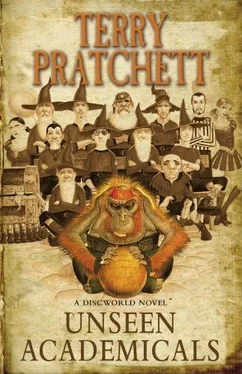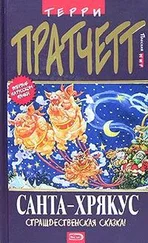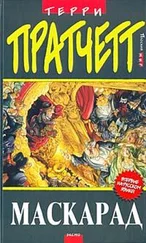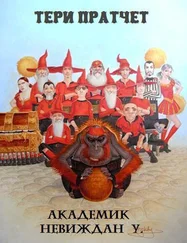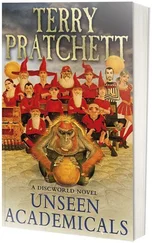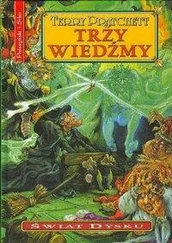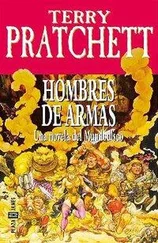This book is dedicated to Rob Wilkins, who typed most of it and had the good sense to laugh occasionally. And to Colin Smythe for his encouragement.
The chant of the goddess Pedestriana is a parody of the wonderful poem ‘Brahma’ by Ralph Waldo Emerson, but of course you knew that anyway.
It was midnight in Ankh-Morpork’s Royal Art Museum [1] Technically, the city of Ankh-Morpork is a Tyranny, which is not always the same thing as a monarchy, and in fact even the post of Tyrant has been somewhat redefined by the incumbent, Lord Vetinari, as the only form of democracy that works. Everyone is entitled to vote, unless disqualified by reason of age or not being Lord Vetinari. And yet it does work. This has annoyed a number of people who feel, somehow, that it should not, and who want a monarch instead, thus replacing a man who has achieved his position by cunning, a deep understanding of the realities of the human psyche, breathtaking diplomacy, a certain prowess with the stiletto dagger, and, all agree, a mind like a finely balanced circular saw, with a man who has got there by being born. (A third proposition, that the city be governed by a choice of respectable members of the community who would promise not to give themselves airs or betray the public trust at every turn, was instantly the subject of music-hall jokes all over the city.) However, the crown has hung on anyway, as crowns do–on the Post Office and the Royal Bank and the Mint and, not least, in the sprawling, brawling, squalling consciousness of the city itself. Lots of things live in that darkness. There are all kinds of darkness, and all kinds of things can be found in them, imprisoned, banished, lost or hidden. Sometimes they escape. Sometimes they simply fall out. Sometimes they just can’t take it any more.
.
It occurred to new employee Rudolph Scattering about once every minute that on the whole it might have been a good idea to tell the Curator about his nyctophobia, his fear of strange noises and, he now knew, his fear of absolutely every thing he could see (and, come to that, not see), hear, smell and feel crawling up his back during the endless hours on guard during the night. It was no use telling himself that everything in here was dead. That didn’t help at all. It meant that he stood out.
And then he heard the sob. A scream might have been better. At least you are certain when you’ve heard a scream. A faint sob is something you have to wait to hear again, because you can’t be sure.
He raised his lantern in a shaking hand. There shouldn’t be anyone in here. The place was securely locked; no one could get in. Or, now he came to think about it, out. He wished he hadn’t thought about it.
He was in the basement, which was not among the most scary places on his round. It was mostly just old shelves and drawers, full of the things that were almost, but very definitely not entirely, thrown away. Museums don’t like things to be thrown away, in case they turn out to be very important later on.
Another sob, and a sound like the scraping of… pottery?
A rat, then, somewhere on the rear shelves? Rats didn’t sob, did they?
‘Look, I don’t want to have to come in there and get you!’ said Scattering with heartfelt accuracy.
And the shelves exploded. It seemed to him to happen in slow motion, bits of pottery and statues spreading out as they drifted towards him. He went over backwards and the expanding cloud passing overhead crashed into the shelves on the other side of the room, which were demolished.
Scattering lay on the floor in the dark, unable to move, expecting at any moment to be torn apart by the phantoms bubbling up from his imagination…
The day staff found him there in the morning, deeply asleep and covered in dust. They listened to his garbled explanation, treated him kindly, and agreed that a different career might suit his temperament. They wondered for a while about what he had been up to, night watchmen being rather puzzling people at the best of times, but put it out of their heads… because of the find.
Mr Scattering then got a job in a pet shop in Pellicool Steps, but left after three days because the way the kittens stared at him gave him nightmares. The world can be very cruel to some people. But he never told anyone about the gloriously glittering lady holding a large ball over her head who smiled at him before she vanished. He did not want people to think he was strange.
But perhaps it is time to talk about beds.
Lectrology, the study of the bed and its associated surroundings, can be extremely useful and tell you a great deal about the owner, even if it’s only that they are a very knowing and savvy installations artist.
The bed of Archchancellor Ridcully of Unseen University, for example, is at the very least a bed and a half, being an eight-poster. It encompasses a small library and a bar, and artfully includes a shut-away privy, of mahogany and brass throughout, to save those long cold nocturnal excursions with their concomitant risk of tripping over slippers, empty bottles, shoes and all the other barriers presented to a man in the dark who is praying that the next thing that stubs his toe will be porcelain, or at least easy to clean.
The bed of Trevor Likely is anywhere: a friend’s floor, in the hayloft of any stable that has been left unlocked (which is usually a much more fragrant option), or in a room of an empty house (though there are precious few of those these days); or he sleeps at work (but he is always careful about that, because old man Smeems never seems to sleep at all and might catch him at any time). Trev can sleep anywhere, and does.
Glenda sleeps in an ancient iron bed [2] That is to say Glenda officially sleeps in the old iron bedstead; in reality most of her sleeping is done in a huge and ancient armchair in the Night Kitchen, where she has very nearly mastered the art of doing without proper sleep altogether. So many crumbs, spoons, bits of pie dough, books and spilt drinks have gone down the sides of the cushions of that chair that it might well now harbour a small, thriving civilization.
, whose springs and mattress have gently and kindly shaped themselves around her over the years, leaving a generous depression. The bottom of this catenary couch is held off the floor by a mulch of very cheap, yellowing romantic novels of the kind to which the word ‘bodice’ comes naturally. She would die if anyone found out, or possibly they will die if she finds out that they have found out. Usually there is, on the pillow, a very elderly teddy bear called Mr Wobble.
Traditionally, in the lexicon of pathos, such a bear should have only one eye, but as the result of a childhood error in Glenda’s sewing, he has three, and is more enlightened than the average bear.
Juliet Stollop’s bed was marketed to her mother as fit for a princess, and is more or less like the Archchancellor’s bed, although almost all less, since it consists of some gauze curtains surrounding a very narrow, very cheap bed. Her mother is now dead. This can be inferred from the fact that when the bed collapsed under the weight of a growing girl, someone raised it up on beer crates. A mother would have made sure that at least they were, like everything else in the room, painted pink with little crowns on.
Mr Nutt was seven years old before he found out that sleeping, for some people, involved a special piece of furniture.
Now it was two o’clock in the morning. A cloying silence reigned along the ancient corridors and cloisters of Unseen University. There was silence in the Library; there was silence in the halls. There was so much silence you could hear it. Everywhere it went, it stuffed the ears with invisible fluff.
Gloing!
Читать дальше
